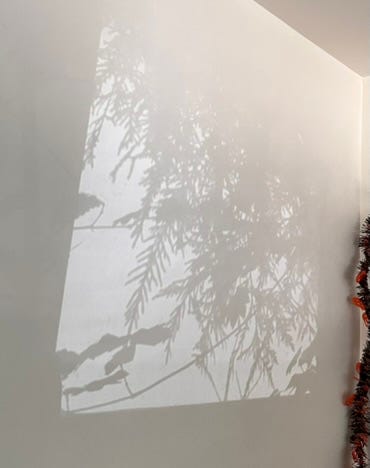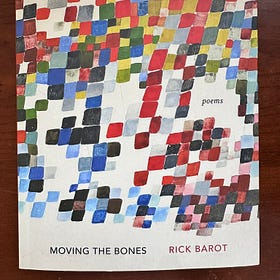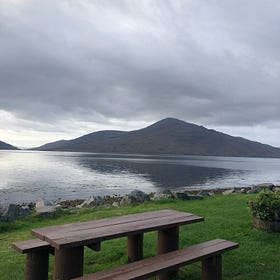In the 2016 movie Arrival the opening scenes depict the main character linguist challenging the military embodiment trying to hire her to figure out what the Sanskrit word for war means and defining it bi-laterally as a disagreement as well as the desire for more cattle.
In the 2025 variant of poetry, the opening discussions in prominent topics are centered around the idea of success. Unfortunately, there isn’t a simple range or bi-lateral definition of success in poetry. You could walk a commodity-centric approach and define success within poetry as reach, books published and sold, access to mainstream avenues of distribution and popularity - in other words, fame. You could walk a competitive and prestige-driven approach where awards, quality of publisher, and competitiveness reigns. You could also walk a language-driven approach where the fixation, mostly, is on attention, experimentation, and self-rigor over what is transcribed onto the page. Personally, I try to keep a communally-driven approach to poetry: that, sure, I’m envious of major authors who win several awards for their works, get major book deals, etc.: that ultimately this doesn’t stop me from wishing to show up for my local community of writers and poets I’ve established here in Seattle.
The French author Paul Valéry who I’ve been in a bit of a rabbithole with lately wrote, “…his wish to keep art itself—Ars—and yet do away with the illusions of artists and writers. He could not stomach the stupid pretensions of poets—nor the vulgar pretensions of novelists. He insisted that clear ideas about what one is doing lead to far more surprising and widely valid results than all the humbug about inspiration, the “Reality” of the characters, etc.” This world of ours is increasingly positing cultural discussions and nuance around the framework of war because language is flexible to the point where it will bend to represent the largest percentages of the world. It so happens that much of the world is under fires of our own making. The desire for more cattle, disagreements over who belongs to whom, and border politics start to blend themselves into everyday speech — with increasing frequency I see recommendations for food or coffee turn into brash contemptuous moments where lists of top three places are agreed upon homogenously and disagreement is treated as a sign of idiocy.
The work of poets today is not merely to write but to locate: language as artifact, as residue, as rupture. A poet today walks amid both wreckage and bloom. This moment, overfull and undernourished, finds its voice in a poetics that is more documentary than declarative, more wound than weather report. And this spawns a familiar anxiety: poetry has become a solipsistic exercise, a loop of incestuous MFA aesthetics and algorithmic curation.
But you really can’t let that anxiety detract from the immense work being produced at all stages. After all, if we’ve learned anything from our primordial caves, it is that a voice is going to emanate. What we’re seeing now is not a collapse, but a splintering, into micro-genres, interstitial forms, hybridities of memoir and theory, yearn and lament. And in that fragmentation, there’s a strange cohesion. It’s not about consensus; it’s about chorus. I’m struck by the renga form lately, and especially this passage from Timothy Clark’s immense write-up on renga in SubStance, “‘Renga’: Multi-Lingual Poetry and Questions of Place.”:
Things “unfreeze” into the metamorphosis, the dream-space of the communal poem. Terms for human speech, or rather the organs of speech (“raised lip of the columns’ fluting”) or terms for writing (“inkstain”) recur throughout the text. In the unstable space of Renga meaning both threatens to abandon writing as a series of mere shapes, and also extends itself to render objects the particles of an alien writing: the environment seems “a frame of nearnesses/surrounding things half-seen: thick, bare/calligraphy and confusion of boughs on air”.
One might look to poets like Diana Khoi Nguyen or Abi Pollokoff, whose formal innovations refuse to let trauma settle into lyric. Their work asks not to be admired but entered, as archive, as testimony, as resistance to flattening. Even the ecopoetic has evolved from pastoral elegy to climate reckoning, in which the natural world is neither metaphor nor muse but site of extraction and complicity. Poets now name species with the reverence once reserved for gods, and the extinction list becomes a kind of psalmody.
Tuesday I was called to witness for a Zoom court case. I dressed, as I described to an acquaintance I walked by on the street just thirty minutes prior to the call, in “cunty purple.” To save you the specifics mostly out of legal necessity, this has been a legal instance ongoing for years now. The individuals involved, I dare to use even the most general of descriptors, are artists. Accusations involve (but not limited to): critiquing a poem, attempting to get the other party arrested at readings they would be performing at. Is this a form of the variant evolutionary tactics of poetry? The response of poetry to an increasingly hostile world - that individuals feel direly compelled to bite and tear in nothing short of aggression when they can sense opportunity to thin the heard of their competition? I hope this is isolated and not indicative of a trend of behaviors, and yet how can one look at the state of men out there generally and not feel compelled to this framework of melancholy: that that type of masculo-aggression has toxified the air we breathe, the rain we are dampened by, the structures which we built to save us: that this masculinity prevails enough that it now exists outside and beyond the male body, it has created a world that we must bridge our way a return from. And yet this moment was a laugh, too, because the best way to reduce audacious powers is to ignore them.
Continuing on the theme of Valery from earlier, I have this remark pulled from Tzvetan Todorov, and Elizabeth Willis in Yale French Studies “Valéry’s Poetics,”
For Valéry, the object of poetics is not a description of different forms of literary discourse, but that of the creative action, considered in an abstract and non-individualized way. Valéry is thus just as unfamiliar with causal biographism, which attempts to explain the individual work by the circumstances of its creation, as he is with essentialist objectivism, which describes the literary discourse rather than the act producing it.
War, in this way, becomes something of a creative action, even if the altogether result of creativity from war is aggression and competition-informed-drivel. If this feels a bit haphazardly strung together, I would ask you to consult previous instances of these essays in which I discuss the loving relationship with nonsense that I have. I would also note that that is simply where my mind has been this week: I’ve been entertained in these worlds of wandering the labyrinthine quotients of thought. For example, dear friend Cora and I played in a Soccer tournament this past weekend, which I’ll write more about below; however, on the drive home, Cora was chatting with me about a billboard in the city that was some pro-jesus device of some kind. Naturally I responded, “I’ve been reading recently from an author named Jacques Derrida who is writing on friendship and he writes about how because anything can be loved but to love is to be alive, it means that loving is a type of divine force wherein the more we love the more life we spawn and the more godly we become. So in a way, loving your friends is even more godly than whatever jesus cult wants us to spend money on them.” A laugh.
Dearest Sarah, known for about a decade now, visited for a workshop for her PhD program and stayed with us. Dearest Sarah, rather allergic to cats, in which we kept her room isolated and as clean as humanly imaginable (for us) such that she might sleep and rest in peace between days-long shifts at the ol’ thinking factory (academia). Which spawned the above moment, after she had left and returned on her flight back to her home, the cats instinctively came back in to assert their dominance over a closed-door space that they had once frolicked in immensely. A whole-stomach laugh.
I’ll save you the length sports description of a Soccer tournament. Besides, a much better writer than I (who I am remiss to say haven’t seen mentioned of recent despite his immense talents), Eduardo Galeano, has written more enticingly of Soccer than I could dream with quotes like: “The goal is soccer's orgasm. And like orgasms, goals have become an ever less frequent occurrence in modern life;” "I play therefore I am: a style of play is a way of being that reveals the unique profile of each community and affirms its right to be different. Tell me how you play and I’ll tell you who you are;” and below:
“Whoever believes physical size and tests of speed or strength have anything to do with a soccer player's prowess is sorely mistaken. Just as mistaken as those who believe that IQ tests have anything to do with talent or that there is a relationship between penis size and sexual pleasure. Good soccer players need not to be titans sculpted by Michelangelo. In soccer, ability is much more important than shape, and in many cases skill is the art of turning limitations into virtues.”
All of which can be found in the must-read book for any fan of the sport, Soccer in Sun and Shadow. Instead I’ll walk you through the day: It’s gray, lightly misting, I’m in a jersey dubbed to be the color cardinal although is more of a burgundy (which, because it’s a queer soccer club, the gays have no problem pointing out), but as a result the team names ourselves the cardinal popes in which case I then spend about 4-6 hours running myself ragged like a dog set loose in a ballpit with several vacuums blowing them in every which direction. I’ve definitely been sweatier; however, I don’t remember a time where I was quite as holistically physically sore after the exertion in the last decade or so at least.
And in other news, there’s a great new Erika de Casier album Lifetime. I’m fairly confident, because of the angle I was sitting at, I had the only view in a coffee shop of two people who were passionately involved in each other in an otherwise surprisingly concealed booth. And I managed to acquire my first parking ticket in years. Parking enforcement is the second most stupid crock of residential living within urban areas, second only to the very concept of fucking landlords.
Thanks for reading, delights. I hope you found these ramblings enjoyable. As always, if you do enjoy, please send me a like, follow, subscription, share, comment, letter, or otherwise affirmation. My utmost heart goes to all who read and survive.
A Poetry of Everyday Life: Rick Barot's Moving the Bones
You can purchase Rick Barot's book "Moving the Bones," here.
How to Promote Your Book
I will begin this exercise by stating: every opinion herein is a result of my knowledge and experience in: literary criticism, book promotion, audience generation, and digital marketing. I have not personally published a manuscript yet and therefore do not know the trials and tribulations t…











J'adore le mot riant! And Todorov? My late mother did a degree in comp lit and Todorov and Barthes were the two books of hers I enjoyed the most--for their accessibility no least.